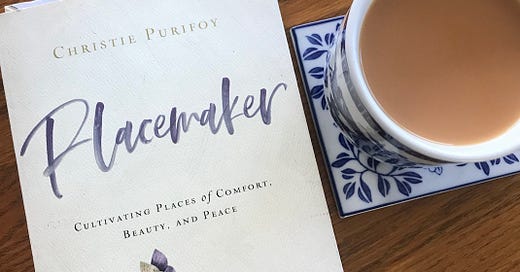I was telling a friend the other day that, even though I don’t believe in New Year’s resolutions (for myself, that is, you do you), I still like the hopeful, blank-slate feeling of a new year.
My friend agreed, but said she always feels the collective disappointment around her, somewhere about January 10th, when resolutions fail and a sort of sadness sets in. She told me she braces for it every year.
Once she mentioned it, I knew exactly what she was talking about. So often January starts off full of new hopes and plans, then a certain glumness descends. Maybe it’s just the weather, or the winter-dark place where I live, but I think it runs deeper. It’s discouraging to realize the sparkle bright new year isn’t going to change everything.
One thing I’ve learned for myself, is that winter is a hard time to make big changes. I’m not sure it’s even a good time to be starting a year. The calendar we use was devised during Roman times—but early Romans used a calendar that started in March and was ten months long (Roman king Numa Pompilius added January and February around 700 BCE).
Many parts of the world still consider spring to be the beginning of the year—the Hindu calendar, the Persian New Year, the Jewish calendar, and the Japanese school year are all tied to spring and the vernal equinox, when new growth emerges and flowers begin to bloom. That’s a more suitable time to start new plans and make changes. The world starts to wake up again after the slow period of winter (if you live in the northern hemisphere).
I’ve learned that, if I want to make changes in the dead of winter, they need to be small shifts.
I’ve shared here about how I had to reclaim reading for myself a few years back, as I had nearly stopped. It felt like my brain was broken—by too much time online and by the onslaught of news. The pandemic was the final blow. By the time I was ready to go to bed at night, I was too weary to focus on something that used to make me so happy: books.
I decided I would find twenty minutes in the day to read—and not wait until bedtime. Usually it ended up being with my morning cup of tea, sometimes it was at lunchtime, and sometimes (to be perfectly honest), it didn’t happen at all. But the days it did were the better days, that was immediately clear.
That’s about the size I think we should be working with: twenty minutes. And if you can’t find twenty, how about fifteen, or even ten?
What if we could shift this small amount of time into the category of doing something we want to do? Maybe it’s drawing, maybe it’s exercising, maybe it’s tidying up so you wake to a home that feels better than it did before, maybe it’s writing a card to a friend, because you’ve decided to prioritize your relationships, maybe it’s working on a creative project, and maybe it’s some form of rest or care for yourself, because that feels like the best, most revolutionary thing you can take on right now.
What if it wasn’t about changing our lives, just small shifts? At the end of the year, how might that feel?
And if you are struggling to even remember what it is that you like to do, what makes you happy (it is January, after all, and war is raging, it’s a hard time to feel joyous). If that’s the case, perhaps it’s time for a new list. It’s easy to lose sight of it in all that is going on and urgent. But I continue to be convinced that we need this sort of replenishment, as fuel for everything else we must do.
I hope you are not feeling deflated by this new year, I hope it still feels full of possibility. But if it doesn’t, consider a tiny shift toward something that suits you better. Make it small, make it sustainable; it might not be time yet to bloom ❤️
PS. That book, Placemaker by Christie Pruifoy, was an utterly delightful read; I really did not want it to end. Her garden books are gorgeous as well.





Morning reading is THE game changer
Small and sustainable are the perfect words to hold in mind when contemplating change (most of the time)